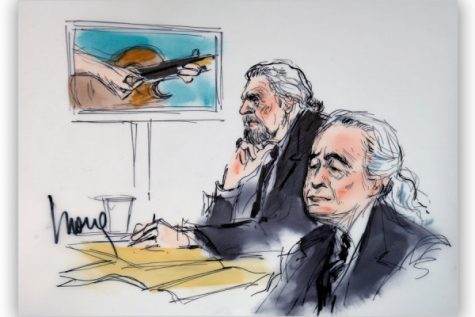Led Zeppelin’s case is a crime against humanity
October 22, 2019
In the vast world of music, boundaries are undefined and limits have yet to be reached. Surely one of humanity’s greatest creations, this auditory form of art knows no true definition; should that random tune you heard someone humming be considered as musical as a piece such as Mozart’s “Le Nozze di Figaro”? People across the world invent new techniques, instruments, and other tools that greatly diversify the meaning of music. Music from a Mongolian morin khuur sounds nothing like a Mexican maraca, which sounds nothing like a Malian kora. One of the greatest cultural symbols has always been the way a society musically expresses oneself.
However, one of the constants of humans’ greatest invention always comes in the form of composition. A song is contrived upon a concoction of chords, melodies, harmonies, rhythms, and countless other parts. Freedom lives between the confines of 88 piano keys. While the options are endless, however, some overlap is always bound to happen; all notes fall into one of the 12 scales, and simpler melodies are of course going to be more common. It is only when humankind started to put these technical terms onto sounds that trouble concerning originality started to arise. At what point does a certain chromatic scale or an arpeggio become copyrightable?
Well, the answer is when money and fame become involved.
Shock, anger and outrage spread this summer when Katy Perry lost a $2.8 million lawsuit against a small Christian rapper named Marcus Gray, who claimed that her 2013 song Dark Horse had copied a minuscule part in his 2008 song Joyful Noise. While the two songs diverged from melody, rhythm, lyrics, harmony and chord progression, they shared a sort-of-similar ostinato (defined as a musical figure that is repeated throughout a song at the same pitch). For a Christian rapper, who in Joyful Noise claims “I love to preach Jesus you can read it in my bars,” he proves to be greedy; sure, Gray can talk the talk, but he fails to walk the walk. One would think that a religious singer that praises how selfless and wholesome his savior is would then in return live a life of indifference to a large paycheck and a couple more plays on Spotify. By confusing a jury of non-musical experts with complicated music jargon, the Teenage Dream singer’s case ended with what musician, composer and Youtuber Adam Neely declares a “dangerous precedent in the music industry.” To view Neely’s exceptional video to why Katy Perry’s lawsuit tiptoes a dangerous line of copyright in music, click here.
Now, just a few months later, this greed strikes yet again. Due to fallacies in the music instruction process, the case that was thought to be settled in 2016 started up again on Monday, Sept. 23. Led Zeppelin, one of the most infamous rock bands in history, is forced to go to court over Stairway to Heaven, one of the most infamous rock songs in history due one of the most infamous guitar riffs in history that once again, as in the Katy Perry case, sounded sort-of-similar to another song’s guitar riff. The accusers are a band named Spirit, who released what was said to be the first version of the musical phrase four years prior. Taurus is a 2:30 minute song, while Stairway to Heaven is an 8:00 minute song. So, according to Spirit, Led Zeppelin’s unusually long song filled with lyrics (while Taurus was merely an instrumental), no repeating parts, vast tempo changes, contrasting chord progressions and different solos with other guitars and drums are not just lightly inspired by Spirit, but instead a clone! The case, in itself, is no short than ridiculous and once again demonstrates a dangerous example in the music industry.
The guitar riff itself is based upon this decreasing chromatic scale: A\ G#\ G\ F#\ F. Spirit’s lawsuit asserts itself to be the sole creator of this concept, and one has to wonder, to what extent does this idea apply to? Should every musician who wants to use this walk down of these exact notes expect a notice that they are being sued over copyright infringement? Should it be just those in a guitar riff, so other instruments are free to go? What if Spirit just goes to proclaim themselves the owners of the A-minor scale altogether?
The Spotify playlist, click here to view, collectively lists out only the two controversial songs but nine other songs that also share some degree of similarity. Here, it could be as obvious as the guitar riff, or in smaller ways, let it be in the key, the chromatic scale or other peculiarities. To understand the reasoning for the court case, my recommendation is to listen to the first twenty seconds in the Led Zeppelin hit and then to Spirit’s song starting at the 40-second mark. The playlist organizes the songs into this ladder or declining alikeness and helps to realize how ridiculous Spirit’s perception ownership is.
“Led Zeppelin’s song is nothing short of ground-breaking, so if they didn’t want attention and money, then Spirit would have sued “Stairway to Heaven” decades ago,” said senior Brooke Henry.

Music is broad and indeterminate itself; to try to assign credibility to recurring patterns existing since the birth of humanity proves the ignorance of not only Spirit and Marcus Gray, but every participant of the money-hungry music industry and beyond. Copyright infringement of music, like most other laws that protect individual creativity, will always be reasonable to a certain extent. However, the recent cases that have found themselves in the heated debates on the nightly news are not under these circumstances. Trying to own any individual part about music, let it be an ostinato or a chromatic scale, is just as naive as trying to own the air we breathe, the warmth we get from the sun, or the light we receive from the moon. Humanity has never reached the limits to what music is and what music will be, and there is no reason that we should now.


Donna R Christ • Mar 3, 2023 at 6:15 am
I think it is absolutely terrible that supposed musicians of today have take and use music from the past to make their song.To me that tells me they have no imagination or creativity.